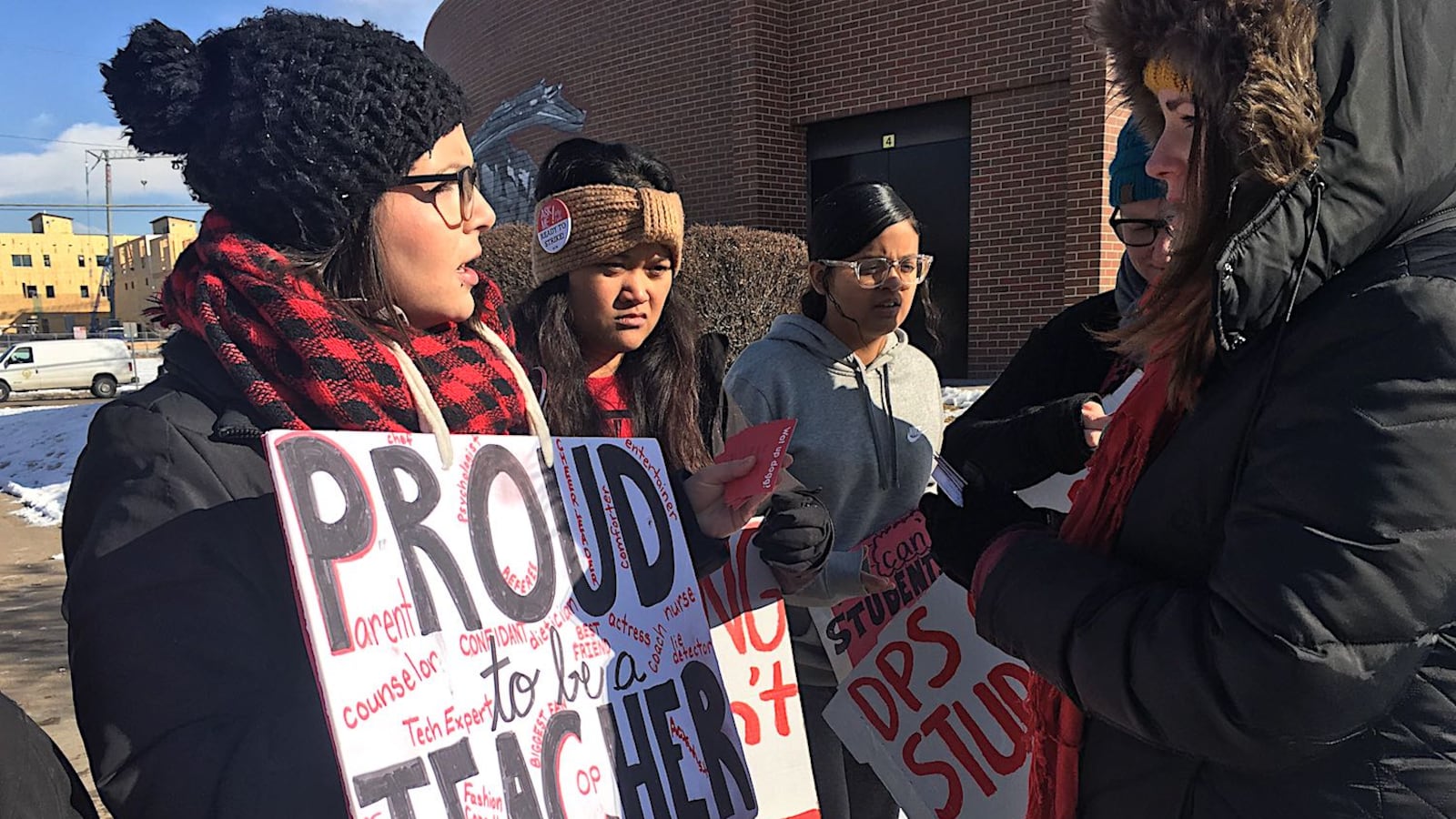Denver educators described empowerment, fatigue, relief, and in some cases residual frustration Thursday after the end of the three-day teacher strike that threw the district into turmoil this week.
Reyes Navarro, who teaches Spanish to kindergarten and first-grade students at Mathematics and Science Leadership Academy, an elementary school in west Denver, used a single word to describe how she felt about the strike: “Power.”
“It was so cold, and we didn’t quit,” she said, of picketing and marching. “We did what we needed to do.”
Moss Kaplan, a creative writing teacher at Denver School of the Arts, said he headed back to his classroom Thursday before knowing exactly what was in the pay deal. But later, after he reviewed the details, he said he was happy with the new salary system. He said most of his colleagues feel the same way.
“Overall, everybody’s far better off than they were a week ago,” he said.
Kaplan said he didn’t realize until Thursday what an emotional toll the negotiations and strike have taken on him.
“It’s really been a couple months that this has been all-consuming,” he said.
Denver teachers went on strike Monday after 15 months of negotiations failed to produce an agreement. Denver Public Schools and the Denver Classroom Teachers Association bargained all through the night and announced a tentative agreement just after 6 a.m. Thursday. It secures higher pay and a more predictable pay schedule for teachers, while retaining bonuses for teachers at high-poverty schools that were a priority for the district.
Marisol Enriquez, principal of Inspire Elementary in Stapleton, said she woke up at 1 a.m. Thursday and was shocked to see that the two sides were still bargaining.
“Am I dreaming? Is this a nightmare?” she thought to herself.
Enriquez, who was glued to social media posts and news reports about the strike this week, said her building ran fairly smoothly despite the disruption. It helped that some of her teachers stayed on the job. But she also understood the motivations of those who joined the strike.
“It’s an important part of our democracy to fight for what you believe in,” she said.
Enriquez said she’s looking forward to having her whole staff back together for a training on Friday. There, instead of talking about long-term strategic planning as planned, they will debrief about the strike, she said.
She expects some teachers might have strong feelings, and she plans to approach it the same way her staff talks with kids about emotional topics: “We have to name our feelings so we can tame them.”
Many teachers said they were satisfied with the agreement hammered out overnight.
“I’m excited. It’s clear,” said Ryan Marini, a social studies teacher and football coach at South High School. “I have a pretty good idea of what I’m going to be paid next year, which is great.”
When Marini went into teaching, his dad told him that it wasn’t the best job, but that it was very consistent and dependable. But ProComp — the district’s complicated pay system — destroyed that, he said. The new deal represents a good compromise in his view.
The strike divided teachers, with roughly 42 percent of them still going to work, according to district officials. Some stayed on the job out of financial need or out of fear related to their immigration status, but many others disagreed with the union position on how teachers should be paid.
While the final deal preserved bonuses for teachers at 30 schools the district labels “highest priority,” for months the union had advocated for getting rid of them and using the money to increase base pay for all teachers. Participation in the strike was lower in the schools that receive those bonuses. Some of those teachers said the strike was a difficult experience because they didn’t see their interests or those of their students represented.
“It was really painful for the people in our building to feel like the union was advocating against the truth of our lived experiences,” said Alison Corbett, a teacher at High Tech Early College, where she and many of her colleagues stayed in the classroom.
Corbett said she shared many of the other frustrations that drove the strike; now she is just eager to move forward from it.
Like parents and staff throughout the district, Beth Corona, a teacher at Maxwell Elementary in the Montbello neighborhood, is relieved that the strike is over. She said the strike brought teachers in her building together, and gave them a new sense of empowerment. Still, she said she was disappointed that it took a strike for the district to agree to significant changes.
“I was kind of hoping that when she started that we didn’t have to be going down this path,” Corona said of new superintendent Susana Cordova, who has been on the job less than two months.
Marini said the strike reflected pent-up frustration with Cordova’s predecessor.
“I feel bad for Susana,” he said. “This was Tom Boasberg’s strike, and she had to deal with it.”
Now, Corona is cautiously optimistic about the future of the district. While the pay changes of the new deal give her hope that she can stay in Denver, Corona got emotional thinking about other changes she hopes might come.
She said she hopes that administrators from central office who covered classrooms during the strike might have learned something.
“A lot of them have not been in the classroom a long time, and they don’t know the reality of what classrooms are like now,” she said. “It was a reality check for them. Teaching is not what everyone might think it is. Sometimes it feels like an impossible job.”
Erica Meltzer and Yesenia Robles contributed reporting to this story.


